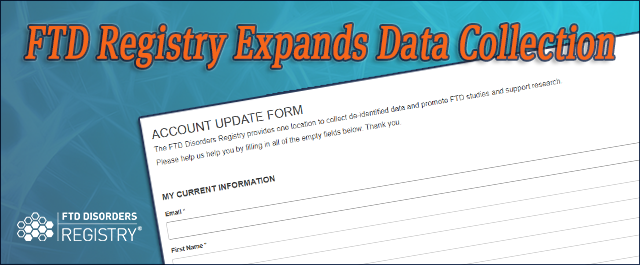PRESS & NEWS
FTD Disorders Registry Expands Data Collection in 2021

In the quest for knowledge, interventions, and cures, FTD Disorders Registry (FTDDR) expanded information that is included in its secure database.
In the quest for knowledge, interventions, and cures, FTD Disorders Registry (FTDDR) expanded information that is included in its secure database. These changes were designed to better serve participants and the entire frontotemporal degeneration (FTD) community.
“Last year the FTD Registry underwent a major revision to its registration process in order to include these additional data fields,” said Registry Director Dianna Wheaton, MS, PhD, CHES. “Our goal was to provide a more user-friendly interface while also collecting additional information.”
The Registry functions as a convenient, online location to collect de-identified data, to promote frontotemporal degeneration (FTD) studies, and to support research.
“We’ve learned through years of registrations and data collection that persons affected by FTD have certain information that they want to provide, regardless of their participation status,” she said. “We’ve also found that we can serve the FTD community better if we gather additional demographic information.”
DATA BENEFITS
As part of the new registration process, those in the Contact Registry can now provide the same enrollment data as those in the Research Registry, Dr. Wheaton explained. “This boosts their role and provides a fuller picture of disease diagnosis and demographics.”
Additionally, regardless of the category of enrollment — whether an FTD-diagnosed person, a biological family member, a spouse, caregiver, or friend — everyone now can provide the additional data.
“For example, an FTD-diagnosed person can now more fully provide information about their care partner,” she said. “Likewise, family members, caregivers, and friends can more fully provide information about their FTD-diagnosed loved one.”
New data fields cover location, contact information, and demographics; caregiver information for persons diagnosed with FTD and details about the FTD-diagnosed person from family members, care partners, and friends.
Previously the Registry did not collect registrant’s city and state. Now, by collecting addresses, FTDDR can map the distance people affected by FTD must travel to clinical locations, research cites, and other resources.
Additionally, by providing disease type and status, the Registry can offer more targeted education and services, such as disease-specific resources and study opportunities.
“It also enhances the data within the Registry so we can enlighten researchers about those who live with this disease,” Dr. Wheaton said. “This is why keeping your information up-to-date is so important.”
PROTECTING PRIVACY
FTDDR account information is stored in an online database that uses a security system with many safeguards and protections. Compliance with HIPAA (Health Insurance Portability and Accountability Act) rules and standards, Canadian privacy laws, and GDPR (the European Union's General Data Protection Regulation) helps minimize risks. The personally identifiable information provided to the Registry is only seen by FTD Disorders Registry staff on a strictly “need-to-know” basis and is never shared.
“The mission of FTD Registry is to collect information and use it to advance science,” Dr. Wheaton noted. “Personal data is never shared.”
To protect a participant’s privacy, a globally unique identifier (GUID) is created. It is a unique ID composed of letters and numbers that enables the Registry to combine data to create summaries and reports.
UPDATING DATA
FTDDR participants can update personal and caregiver information at any time from their account dashboard.
Those Registry members who have data fields that need to be updated will receive an email from Dr. Wheaton in the next few weeks with instructions and a special link that directs them to an online form to easily and securely provide their information.
“Participation in the Registry is valuable to advance the science, so we created special forms to assist those who joined prior to the new registration process to easily update their account,” she said. “We appreciate everyone taking the time to do this.”
If at any time you have questions, please contact a member of the Registry staff:
- Email: manager@FTDregistry.org
- Phone: 888-840-9980
- Website chat: www.FTDregistry.org
“On behalf of the FTD Disorders Registry, researchers and clinicians, and all of you who deal with this disease on a daily basis, I thank you for your contributions to science as together we work toward treatments and cures for FTD,” Dr. Wheaton said.
Together we can find a cure for ftd
The FTD Disorders Registry is a powerful tool in the movement to create therapies and find a cure. Together we can help change the course of the disease and put an end to FTD.
Your privacy is important! We promise to protect it. We will not share your contact information.



